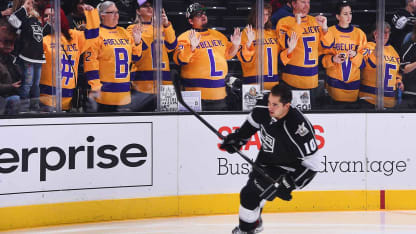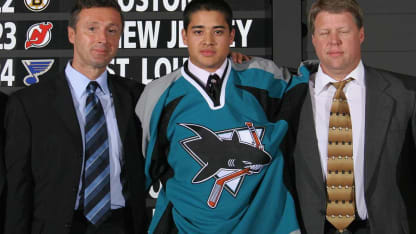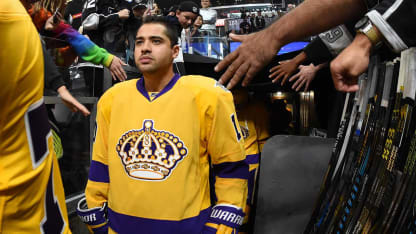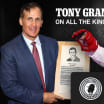Life is full of choices.
For Devin Setoguchi, those choices haven't always been obvious, always right, or always easy, but's he's made darn sure they have always been his.
On Saturday, Setoguchi scored his first two goals of the season against his former team, the Calgary Flames, and the first in over two-and-a-half years. During that time, Setoguchi was sent to the minors, became depressed, diagnosed himself as an alcoholic, put himself in rehab, got married, got cut from an NHL training camp, played professional hockey in Europe, and has worked all the way back to a roster spot with the LA Kings.
Go ahead, plot that on a graph.
Meet Devin

By
Deborah Lew @by_DeborahLew / LAKings.com
It all started out for Setoguchi just like it does for most Canadian kids. Hailing from Taber, Alberta, about two-and-a-half-hours outside of Calgary, Setoguchi began playing hockey as soon as he was able.
"I started hockey when I was three, pretty much like every Canadian kid - you learn to walk, you walk with skates on," explains the 29-year-old.
Setoguchi's ethnic background is a quarter Canadian, a quarter Swiss, and half Japanese. His paternal grandparents were originally from British Columbia, but were sent to Japanese internment camps during World War II. Their subsequent relocation to Alberta is how they met. Currently, there are many Japanese famers living Taber as a result of that relocation, the Setoguchis included. Setoguchi's father has worked on their family's farm for over 40 years, cultivating more than 100 acres of potatoes.
"I'm not much of a farmer, my dad can attest to that. I was too lazy to be on the farm," Setoguchi admits. "When I got to be a certain age, about 14, my dad said 'either work on the farm or work out.' So I was more on the work out side. I wasn't meant to be a farmer."
Growing up, Setoguchi was a fan of the Philadelphia Flyers, adopting his hockey-playing dad's favorite team. Setoguchi was a big fan of Eric Lindros and the Legion of Doom line, and, being half Japanese, also idolized Paul Kariya.

Seems like a pretty normal story for an NHL-er, and according to 'Seto,' as he is nicknamed, it was. Setoguchi was drafted eighth overall in the 2005 NHL Entry Draft by the San Jose Sharks. He did well during parts of four seasons with the Sharks, well enough to earn him a sizeable contract extension at the end of the 2010-2011 season. But he was traded shortly after signing the extension and played for three different teams over the next four seasons, at the conclusion of which saw him sent down to the minors.
Somewhere along the way Setoguchi started turning to alcohol on a frequent basis.
"At a certain point you start making a lot of money, and you're not sure what to do with it, and at that point I just got wild. I could go out and party and when you're younger you can get away with that," Setoguchi shares. "But all of a sudden I'm 25 and I'm like 'whoa, this is a hangover? I haven't had one of these in a long time.' It was something where I had passed the threshold of being a kid and I didn't know how to handle a lot of the pressures and a lot of the stuff that was happening to me."
When he felt he had hit rock bottom, Setoguchi decided he needed help. On April 5, 2015, he checked himself into a Malibu rehab facility with his dog, and the two remained there for over a month.
"You learn a lot about yourself, how to handle different situations and coping with pressure and dealing with situations in different manners than numbing pain with alcohol, so it was really good for me," confided Setoguchi.
Now, sober for more than 19 months, Setoguchi is the happiest he's been in almost two years, and is looking forward to his second sobriety anniversary. He also believes his story can help others.
"I think the biggest thing with people battling depression or alcoholism is that you tend to feel like you're always alone and you're kind of shut off, like no one understands it, and you're embarrassed too," Setoguchi conceded.
Coincidentally, Setoguchi has close friends he has been able to share his experiences with - one coming up on 10 months of sobriety, another just short of one year - and the feeling of not being alone played a huge role in his recovery.
"These people you never thought in a million years it would happen to them, people you've never really known, they call you and they say they've heard your story and it's great, so it's really nice to be able to help other people and at the same time help yourself and feel good about it," says Setoguchi.
His advice to others who may be going through what he went through is simple, yet challenging:
"Let them know that they don't have to be alone, whether it's talking to a parent or a close friend, just be vulnerable. I think that's the biggest thing - we're taught as males to be macho and not talk about our feelings or keep them to ourselves. That was a big part for me to be emotionally involved - in being able to cry or say something or asking for that help. That's the biggest thing is being able just to talk about it and once you do you feel a lot better about a lot of things."
There's no question that being a professional athlete with your life under a microscope complicates an already fragile situation even more.
"It's hard because you have your life at the rink and the stress and the pressure and the reputation you have to live up to, then away from the rink you have your relationships, your family relationships and whatever is going on in your life away from there," Setoguchi elaborates. "So if it's not going at the rink, then it comes home with you and sometimes it's really too much for a lot of people to handle.
"That's where the general public doesn't understand the amount of stress and pressure that is on an athlete to perform, based on salary. If you're making $5 million and you're not scoring, that's your job. Then you have the media on you and you have the fans on you, and you come home and you're reading everything, and as much as people say they don't read the media, you read it and it's everywhere," admits Setoguchi. "We are blessed in this situation we are put in, to be able to play in this league. But a lot of people need to realize we are just normal humans as well."
In the Fall of 2015, Setoguchi earned a professional tryout contract with the Toronto Maple Leafs, but was dismissed after camp. He ended up playing last season for HC Davos in Switzerland, and worked hard this past summer to earn himself a professional tryout with the Kings. While he is currently working on finding the stride that once allowed him to score 31 goals in a season, it hasn't been easy.

"It's been tough," Setoguchi declares. "The League has evolved so much in two years. The game is so fast and so quick and I'm getting older, but it's been good. I'm thankful for every opportunity that I have. I'm thankful to Blakey [assistant general manager, Rob Blake, who played with Setoguchi in San Jose] for letting me come to camp, I'm thankful to Dean [Lombardi] for signing me to a contract, I'm thankful to Darryl [Sutter] for believing in me and playing me, so it's been really good. So far, no complaints. Every day is a new day for me to try and get better and work on becoming a better person and player.
Now, Setoguchi's life at the rink and away from it are not only drastically different from the way they were two years ago, but they're pretty fantastic.
Setoguchi married his longtime girlfriend, Kelly, in August of 2015, and the couple has two Miniature Australian Shepherds. They make their home in San Jose where they met, and they recently joined a country club, where Setoguchi can indulge in his second favorite pastime, golf. Calvin Harris and progressive house music is what can be found on his Spotify station, and the Movie Channel is what's most likely playing on the tv, as Setoguchi enjoys everything from Action to Romantic Comedies to Disney flicks.
All things considered, perhaps the best way to learn about the Kings new right-winger is to simply check out his tattoos. On his back is a large samurai warrior - no doubt a representation of his Japanese heritage. On his left arm is a cross with the words 'forever in my heart,' along with the initials of both his parents and his older sister, all of whom he is very close to. And on the inside of his right bicep are the words 'never let a stumble in the road be the end of the journey,' words he composed for himself after he got sober. An obvious lover of tattoos, the next one he plans on getting for his dogs.
Twenty months ago, Devin Setoguchi was playing in the minors, at the lowest point of his life, professionally and personally. Last weekend, he scored two goals against the team that sent him to the minors.
Looks like his choices are working out for him after all.


















